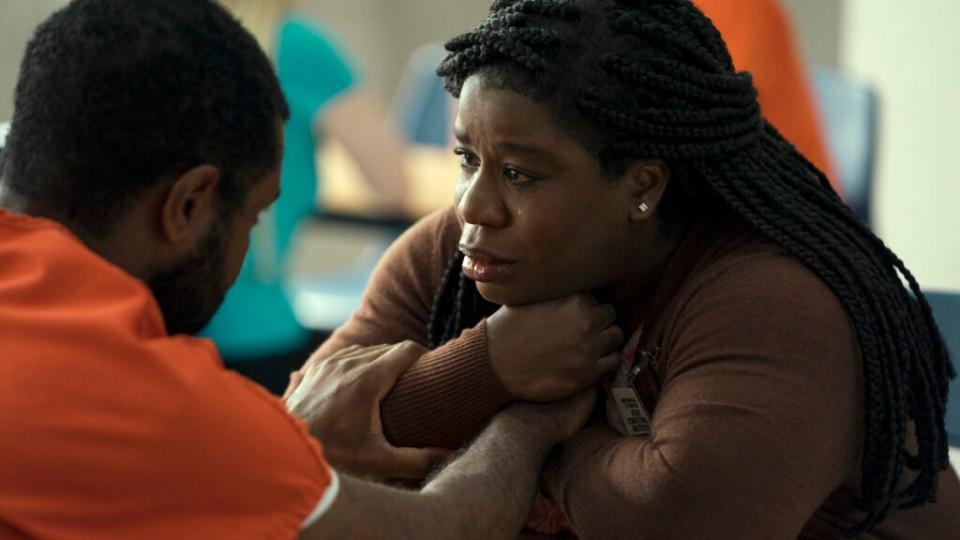‘Painkiller’ Review: Netflix Opioid Crisis Limited Series Can’t Compete With Superior ‘Dopesick’
It’s hard to say how “Painkiller,” a fictionalized Netflix limited series based on America’s opioid crisis, would play had one never seen the similarly themed and structured – and vastly superior – 2021 Hulu limited series “Dopesick.”
The new show’s misuse of lead actors Uzo Aduba, who plays a crusading U.S. Attorney’s office investigator, and Matthew Broderick, who plays real-life former Purdue Pharma head Richard Sackler – would be evident either way. So would director Peter Berg’s (“Hancock,” the film “Friday Night Lights”) overuse of early aughts-style rock ‘em sock ‘em shaky camera work, quick edits and blue light.
But “Painkiller” likely would not seem so wholly unnecessary if “Dopesick” did not exist.
Unfolding over six hour-long episodes, “Painkiller” makes compelling points about Purdue, the pharmaceutical company that overhyped the painkilling potential of its drug OxyContin while underplaying its addictive qualities. Characters repeatedly call OxyContin what it is: heroin in candy coating. Such frankness still seems revolutionary given Americans’ training from birth that pharmaceuticals equal healing while street drugs cause death and despair.
The twain have met for eons, of course, but suburban moms’ diet pill habits never reached the apex of mass devastation that OxyContin sparked, especially in rural areas. “Painkiller” movingly illustrates this destruction in the descent of North Carolina mechanic and garage owner Glen (a highly sympathetic Taylor Kitsch, from the TV show “Friday Night Lights”) who is prescribed OxyContin after he injures his back on the job. Within weeks, Glen goes from responsible husband, father and employer to addict scrabbling for errant pills among the dust bunnies under the family’s kitchen appliances.
Although we could have done without closeups of Glen on the operating table, Kitsch’s performance feels entirely truthful, as does the slow-build impatience and disgust Carolina Bartczak brings to her performance as Glen’s previously patient and upbeat wife, who takes a while to catch on to her husband’s addiction.

But the new show’s fundamental narrative approach — shifting points of view from street-level addict to pharmaceutical sales professional to government representatives seeking to prosecute Purdue – is so close to “Dopesick” that it unfortunately begs comparison between Kitsch’s performance and Emmy nominee Kaitlyn Dever’s devastating work as an addict on the Hulu show, and it pales.
Created by Micah Fitzerman-Blue and Noah Harpster, with Berg directing every episode, “Painkiller” draws from different sources (a New Yorker article by Patrick Radden Keefe and a book by Barry Meier) than “Dopesick,” yet its newly minted pharmaceutical rep (West Duchovny) seduced by a big salary into overselling OxyContin to doctors is uncannily similar to Will Poulter’s character in “Dopesick.” Each character even comes with a glamorous, morally iffy sidekick (Phillipa Soo in “Dopesick,” Dina Shihabi here).
Again, the similarities do “Painkiller” no favors. Although Duchovny sells the awkwardness of her character’s first sales calls, she does not convince as the high-powered saleswoman her character becomes. Shihabi, by contrast, makes a compelling shark.
“Painkiller” fails most noticeably by preventing Aduba and Broderick from delivering effective performances. Aduba mostly comes across as a gruff pontificator. The first attribute might be acceptable, since her character, Edie, must blow past the hemming and hawing of the crooks she catches perpetrating medical fraud.
But Aduba narrates more often than acts. In the first episode, Edie sits down at a law firm and proceeds to lay out the story of the Sacklers and OxyContin for the lawyers across the table. This session, during which Edie makes ostensibly off-the-cuff observations that sound like entirely scripted pronouncements, becomes a narrative thread throughout the series. This despite a second framing device of starting each episode with interviews with real people who lost loved ones to OxyContin abuse. Their accounts are awful, but “Painkiller” is also decidedly overframed.
Edie’s backstory, when she is allowed one, comes off as pandering: Her mother was a crack cocaine addict and her brother (Jamaal Grant), from whom she is estranged, is in prison for selling drugs. When Edie, this show’s only prominent Black character, recalls the “aha” moment she connected the crack and OxyContin epidemics, it plays as the showrunners’ clumsy attempt at a “we’re-all-in-this-together” moment equating a mostly Black crisis with a mostly white one. But we all know which crisis received two prestigious limited series treatments in the space of two years.

Of course it is possible a successful federal investigator of any race came from a drug-affected family. But did Edie really need personal motivation to want to fight the Sacklers? Isn’t their alleged malfeasance enough? At least the relationship with the brother provides opportunities for Aduba to effectively emote instead of orate.
Broderick’s performance starts with promise when his Richard Sackler, who is making gains in trying to turn a Purdue drug previously used only for palliative care into a remedy for aches and pains, stares blankly into the camera. But just when you are about to commend the showrunners for casting an actor who can embody the banality of evil, they turn Richard Sackler and the merry white men of his corporate office into buffoons.
Fellow family members and hangers-on flail and yell when trouble hits; Sackler dons sunglasses and dances with literal OxyContin cheerleaders at a Miami sales conference even as Purdue is under fire for irresponsible practices. The writers’ conceit of having Richard’s late uncle, family patriarch Arthur Sackler (Clark Gregg), appear to Richard as a devil on his shoulder increases the ham quotient.
Comically heightening the Sackler storyline does not suit a show that otherwise takes the opioid crisis seriously. Although lawsuit settlements in the billions of dollars and the family name being forever ruined seems to have defanged the Sacklers to a degree, it feels irresponsible to present Richard as anything other than calculated. Poking fun at people tends to humanize them. Donald Trump has been lampooned in the media for decades. Look how that turned out.
“Painkiller” premieres Thursday, Aug. 10 on Netflix.
The post ‘Painkiller’ Review: Netflix Opioid Crisis Limited Series Can’t Compete With Superior ‘Dopesick’ appeared first on TheWrap.

